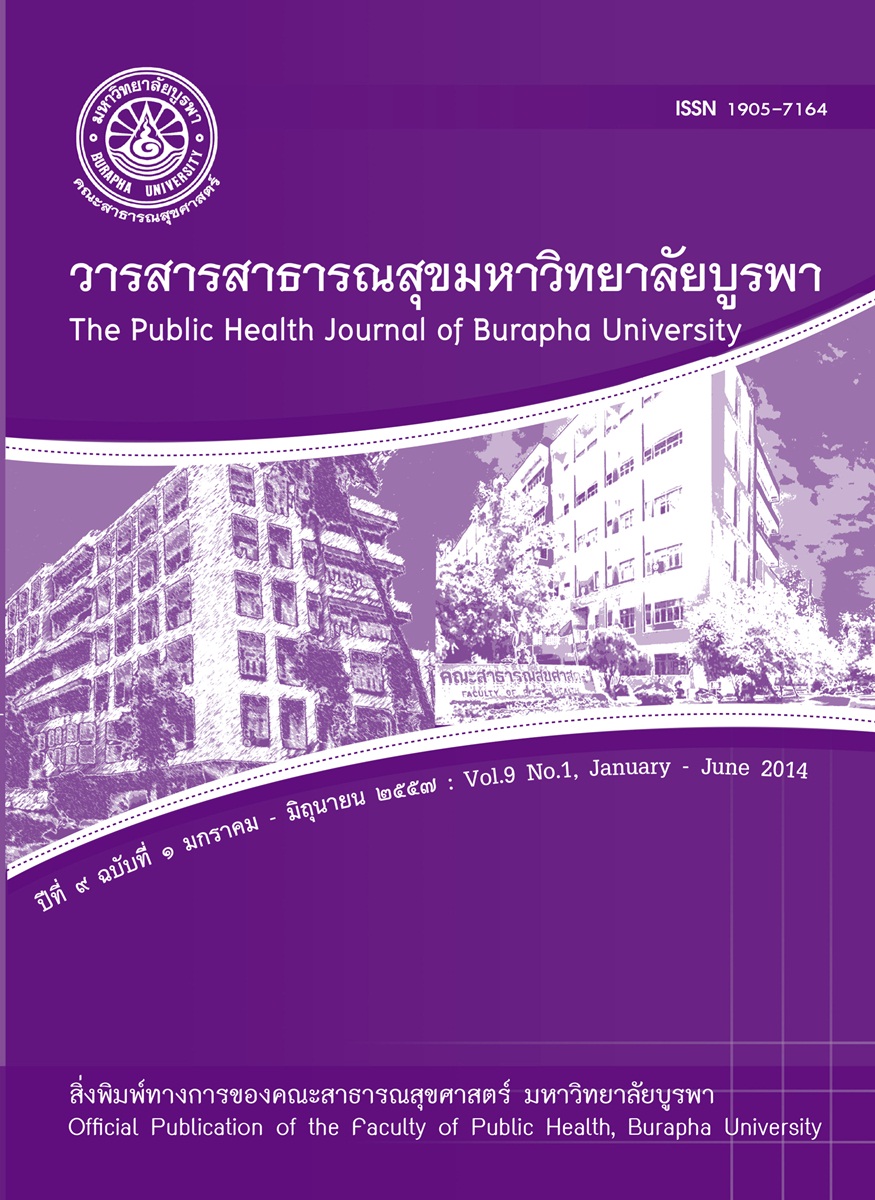ผลของโปรแกรมสร้างเสริมสมรรถนะแห่งตนและการมีส่วนร่วมของครอบครัวต่อ ความมั่นใจในการหลีกเลี่ยงการสูบบุหรี่และความตั้งใจไม่สูบบุหรี่ของนักเรียนชั้นประถมศึกษาชาย
Main Article Content
บทคัดย่อ
การศึกษาครั้งนี้เป็นการวิจัยกึ่งทดลองแบบสองกลุ่มวัดก่อนและหลังการทดลองมีวัตถุประสงค์เพื่อศึกษาผลของโปรแกรมสร้างเสริมสมรรถนะแห่งตนและการมีส่วนร่วมของครอบครัวต่อความมั่นใจในการหลีกเลี่ยงการสูบบุหรี่และความตั้งใจไม่สูบบุหรี่ กลุ่มตัวอย่างที่ศึกษาเป็นนักเรียนชายที่กำลังศึกษาอยู่ในชั้นประถมศึกษาปีที่ 5-6 สังกัดสำนักงานเขตพื้นที่การศึกษานครราชสีมาเขต 5 แบ่งเป็น กลุ่มทดลองและกลุ่มควบคุมกลุ่มละ 20 คน โดยกลุ่มทดลองได้รับโปรแกรมสร้างเสริมสมรรถนะแห่งตนและการมีส่วนร่วมของครอบครัว นาน 4 สัปดาห์ ซึ่งพัฒนาจากแนวคิดของ Bandura (1997) และ Friedman (1997) ส่วนกลุ่มควบคุมได้รับการเรียนการสอนตามหลักสูตรแกนกลางการศึกษาขั้นพื้นฐานตามปกติ เก็บรวบรวมข้อมูลโดยใช้แบบสอบถาม วิเคราะห์ข้อมูลโดยใช้สถิติ ร้อยละ ค่าเฉลี่ย ส่วนเบี่ยงเบนมาตรฐาน Chi - square test, Paired t-test และ Independent t - test ผลการศึกษาพบว่ากลุ่มทดลองมีความมั่นใจในการหลีกเลี่ยงการสูบบุหรี่และความตั้งใจไม่สูบบุหรี่ภายหลังการทดลองมากกว่าก่อนการทดลองอย่างมีนัยสำคัญทางสถิติที่ระดับ .05 (t = 4.022, p – value = .001; t = 3.053, p – value = .007 ตามลำดับ) และกลุ่มทดลองมีความมั่นใจในการหลีกเลี่ยงการสูบบุหรี่และความตั้งใจไม่สูบบุหรี่มากกว่ากลุ่มควบคุมอย่างมีนัยสำคัญทางสถิติที่ระดับ .05 (t = 4.233, p – value = < .001; t = 3.341, p – value = .002 ตามลำดับ)ผลการศึกษาเป็นประโยชน์แก่บุคลากรสาธารณสุขครูและผู้ที่เกี่ยวข้องในการนำกิจกรรมไปประยุกต์ใช้เพื่อเสริมสร้างศักยภาพให้วัยรุ่นชายตอนต้นมีความรู้ มีทักษะ เกิดความมั่นใจและตั้งใจในการหลีกเลี่ยงการสูบบุหรี่ ซึ่งนำไปสู่การป้องกันพฤติกรรมการสูบบุหรี่อย่างมีประสิทธิภาพของวัยรุ่นไทย
This study was a quasi - experimental study with nonequivalent control group pretest posttest design. The purpose of this study was to evaluate the effects of a self-efficacy enhancement and family participation program on smoking refusal self- efficacy and intention to not smoking. The participants were male primary school students who were studying in Pratomsuksa 5 - 6, Nakhonratchasima Educational Service Area Office 5. They were divided into experimental and control groups of 20 people each. The experimental group participated in self-efficacy enhancement and family participation program. The program with a period of 4 weeks was developed based on the concept of Bandura (1997) and Friedman (1997). The control group participated in the basic core curriculum. Data were collected by self-administered questionnaires. Statistical analysis was performed using percentage, mean, standard deviation, chi - square test, paired t-test and independent t- test. The findings revealed that the experimental group had the higher refusal self- efficacy and intention to not smoking, compared to those in pre-experiment significantly at the level of .05 (t = 4.022, p – value = .001; t = 3.053, p – value = .007). The experimental group had the higher refusal self- efficacy and intention to not smoking to those in control group significantly at the level of .05 (t = 4.233, p – value = < .001; t = 3.341, p – value = .002 ). The study is useful for health professionals, teachers and those involved to apply the activities for enhancing the knowledge, skill, refusal self- efficacy and intention to not smoking of early adolescents which will enhance the effectiveness of smoking prevention program among Thai male adolescents.

